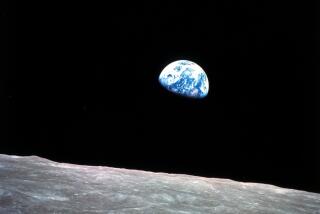Astronauts Help Us See Who We Are
- Share via
I was in fourth grade when we learned of the Challenger tragedy in 1986. Our teachers had been thrilled about Christa McAuliffe’s mission, and their enthusiasm was contagious. When the shuttle exploded, we sank into despair. Our teachers’ tears were reminders that adults did not have the control over the world we thought they did.
Now, 17 years later, I teach eighth-grade English to a wonderful group of bright, creative students. There were some problems during the ‘80s, but now my students must comprehend more frightening issues -- terrorist attacks on our country, an increasing possibility of another war -- and the Columbia catastrophe. Yet in the classroom, I consistently see faces of promise looking up for guidance.
Most children are confused about world events. They want to express themselves and feel part of a community. By showing our love through listening and sharing with them, we can help prevent them from feeling the world is hopeless. Now is the time to teach the value of serving others, working for peace and keeping our faith.
Kalpana Chawla, the first Indian-born woman in space, was among the seven who perished on Columbia. It was her dream to be in space.
She said, “When you look at the stars and the galaxy, you feel that you are not just from any particular piece of land, but from the solar system.” Let us make our children’s world the beautiful and united place these astronauts died gazing upon.
Celina Collins
Huntington Park
*
Ilan Ramon was no ordinary pilot. He understood the symbolism of his mission and what he meant to a beleaguered people back home in Israel. When he boarded the space shuttle Columbia, he carried with him a small Torah that was used at the bar mitzvah of one of his colleagues in a concentration camp in Germany almost 60 years ago.
In an interview last week from space, Ramon said this keepsake, like his mission, “represents more than anything the ability of the Jewish people to survive despite everything from horrible periods, black days, to reach periods of hope and belief in the future.” The irony is palpable, the pain acute. Godspeed, Ilan Ramon.
Stuart D. Tochner
Los Angeles
More to Read
Sign up for Essential California
The most important California stories and recommendations in your inbox every morning.
You may occasionally receive promotional content from the Los Angeles Times.













